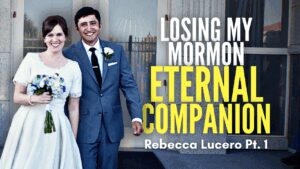Join me today for one of my favorite Mormon Stories Podcast interviews/interviewees of all time. In today’s episode, Stanford University graduate student Amy McPhie Allebest returns to discuss the development of patriarchy within human civilization, with a specific focus on the religious context. She also announces her new podcast entitled “Breaking Down Patriarchy – An Essential Texts Book Club.”
Patriarchy has incredibly deep roots in the human condition, and harms everyone – especially women, but also men, youth, and children. This episode is for ALL of us, and you will not be disappointed with Amy’s incredible knowledge, insight, and compassion.
The Oxford Dictionary defines patriarchy as “a system of society or government in which men hold the power and women are largely excluded from it.” All cultures all over the world practice patriarchy, sometimes violently, sometimes seemingly benevolently, sometimes in ways we are so accustomed to that we don’t even notice. But when was patriarchy instituted? How? Why? Who has challenged this system, and how have their critiques changed the world?
Breaking Down Patriarchy: An Essential Texts Book Club answers these questions, as well as addressing the very personal ways that patriarchy impacts our lives and relationships. Every week, an intelligent, insightful, relatable guest joins host Amy McPhie Allebest to read and discuss a historical text. Listeners are invited to read the book ahead of time, but even if they are not able to read, Amy and her reading partners provide a thorough “breakdown” of the issues and powerful, practical takeaways that benefit the real lives of women – and men! – everywhere. Check out the introductory episode to hear about the reading list, and the egalitarian vision that aims to foster the flourishing of all human beings, including boys and men.
You can listen to Amy’s previous Mormon Stories interview, where she discusses her article “Dear Mormon Man, Tell Me What You Would DO” by clicking here.
Amy’s Bio: I grew up in Colorado as the oldest of 5 children, reading, writing, drawing, singing, and practicing the piano and violin. I attended Brigham Young University, where I met Erik Allebest during my first week of freshman year, studied abroad in Israel, lived in Chile for a year and a half as a missionary, and married Erik all before graduating with a degree in English. Erik and I moved around – to Colorado, Southern California, Utah, Spain, and Northern California – while Erik started and ran chess businesses for a living (primarily chess.com) and I stayed home to raise our four children. Those four kids have become brilliant, hilarious people and are our very best friends. I am a long-time trail runner, a recent CrossFitter, a lifelong reader and writer, and an almost-graduate of Stanford University’s Master’s of Liberal Arts program.
www.breakingdownpatriarchy.com
Facebook: facebook.com/breakingdownpatriarchy
Instagram: @bdownpatriarchy
Twitter: @bdownpatriarchy




7 Responses
I love my wife. We fell into the roll defined for us. My wife is a great mother and home maker. I also have 7 daughters. I want my daughters to be able to reach their potential, but I dont know how to encourage them without appearing ungrateful or critical of their mother.
I had a really sad experience with one of my daughters. There was a discussion in seminary that fathers should interview their daughters fiance. I told that I probably wouldn’t because she was not my property and I would stand in her way of marrying. She was very disappointed.
Consent had been very difficult in my marriage. I am never confident that I have true consent from my wife or is she just submitting to the responsibility she feels to provide for me.
I’m not going to be able to reply to many of these comments but I do want to reply here. First, thanks for listening, James! I’m very touched by the examples you shared.
I can absolutely relate to your feeling about your wife, because my mom was also a wonderful mother and homemaker, and I don’t want to appear ungrateful or critical of her either. That’s constantly on my mind as I present the information in these books, especially since some of the 20th Century works are very critical of that choice. I myself have been a homemaker since my first child was born in 2001, and I treasure my time with my children and my role as a mother above all else, so you’ll hear in my episodes on Beauvoir and Friedan that I am careful to defend women’s ability to choose – not to prescribe one way of doing things as the only way. In my view, an egalitarian, “partnership” family and society means that women participate equally with men in making decisions, and all humans are encouraged both to invest in meaningful relationships and to thrive as individuals. Each couple should decide what works for them during the different phases of their lives.
About interviewing your daughter’s fiancee, I think it’s so great that you’re aware of the problematic historical roots of that practice. With that said, when my dad interviewed my fiancee, I felt very loved. So it’s complicated. With our kids, my husband and I plan to talk formally with our kids’ potential spouses together (regardless of their gender). That way we get to keep the beautiful aspects of that rite of passage – transferring stewardship of the parent to the adult child’s spouse… but without the vestige of male ownership of females. That’s one idea… although if your daughter really wants it to just be you, then maybe just honor your daughter’s wishes. ? There’s no one way, but I think it’s so wonderful that you’re asking the questions.
And last, your attitude regarding consent is what I wish I saw from every man. You are right to worry that a woman raised in a very patriarchal culture, and especially if she is older than I am, will have absorbed a lot of messaging that places the male at the center, with her job to support and appease and please. Being sensitive to that, and encouraging her to speak up and participate as a full partner (especially if you are willing to be overruled as often as you overrule, or to keep negotiating until consensus is reached) is the best thing you can possibly do. Change is hard – it requires great strength – and I am so heartened to read about your efforts. Thank you for sharing!
Amy,
The book, Misquoting Jesus, by Bart D Ehrman, will give you the Greek translation of the sorry quotes In the New Testament that shade women negatively.
Suzann
What a great conversation. Thanks to both of you.
I have very recently started exploring exmormonism, after being away from the church since high school in the early 70’s. I’m retired now from 30+-years of federal civil service including time as a senior executive in an Interior agency. When I started in 1979 the agency leadership and the organization still looked pure mormon. Its pretty amazing that over that short time I saw that agency respond change to actually openly embrace diversity to a great exte
When I started the agency Organization looked a lot like the church. I think it just reflected the ease of operating a white patriarchal autocracy; if you leave the job to white men. As congress reacted to the emerging valuation they gave policy guidance to the executive branch and it started to change in response.
For the church to change they need the cover of policy
Made it through? Savored it. Listened to it all today!
What an amazing episode! It was worth every single moment of listening. I even found myself rewinding several times to write down references, or things that were said. I had to break it into a few sittings, and found myself counting down until I could listen again. I was so excited, and never lost interest for a second of it. I wrote down many of the books talked about so I can buy them, and I’m looking forward to listening to Breaking Down Patriarchy Podcast. Thank you both for doing all of the hard work to make this episode possible! Amy is just an amazing human being, and I felt so inspired as a woman listening to her! Also, I’m looking forward to the post covid party! :)
Not a Mormon but I am a feminist and love Amy’s insights, way of speaking about these very important things. I am in my 70’s, educated by catholic nuns etc. So many times I, too, have said…WHY wasn’t I taught these things..these important stories!? Doing my best to catch up now. I will be reading her recommendations, checking out her podcast . Love listening to her wise words.